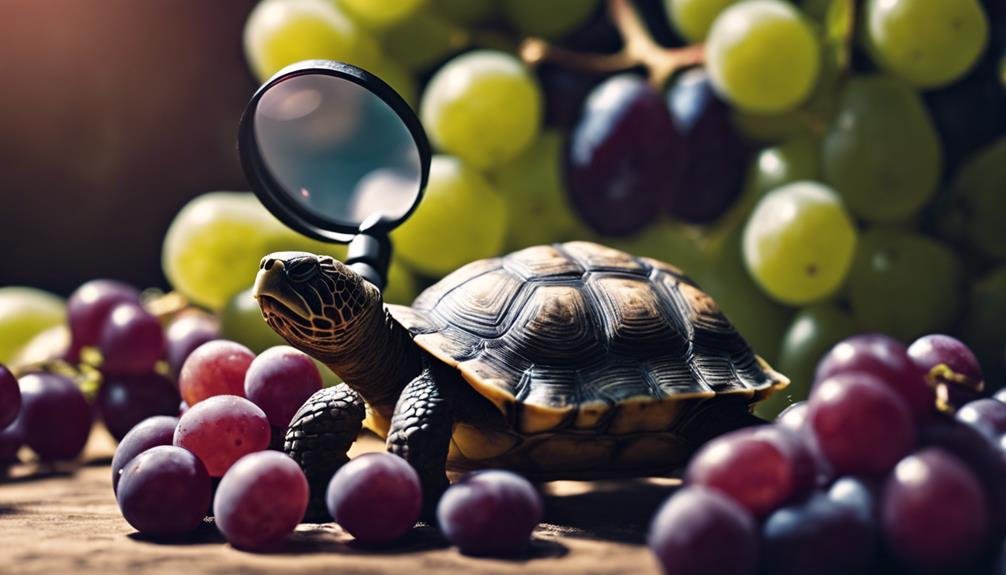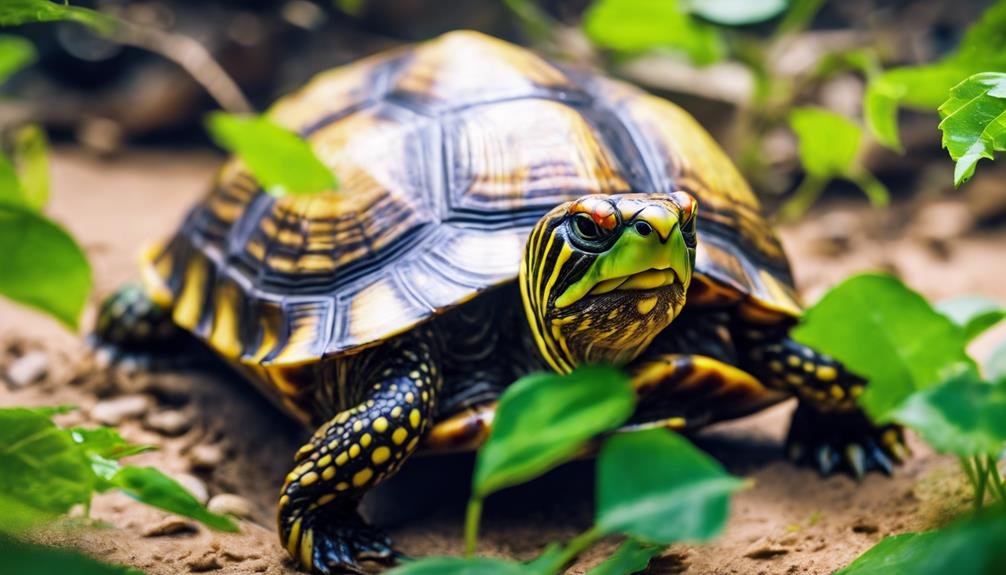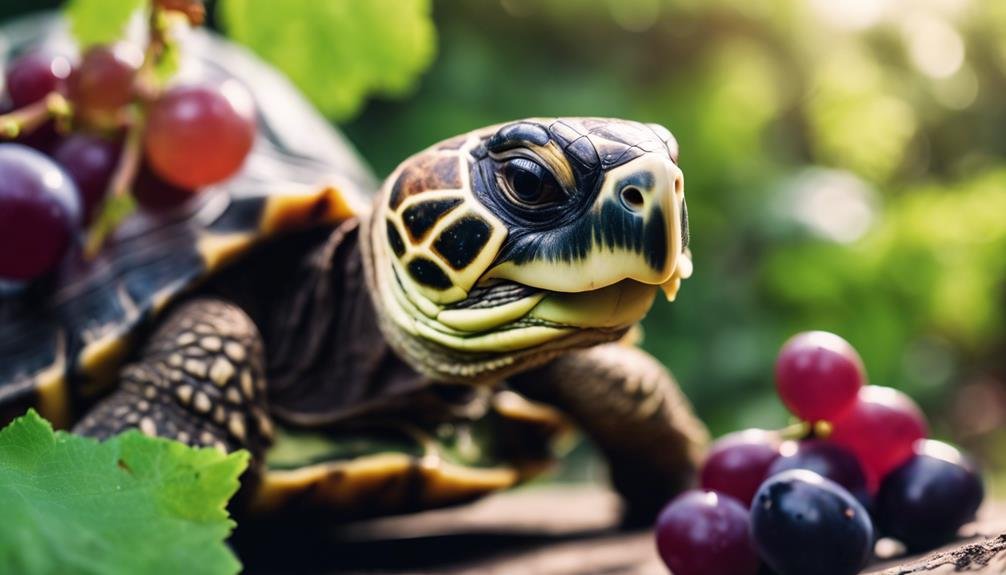You’ve probably wondered whether you can share some of your favorite snacks with your shelled friend, especially something as tempting as grapes. Yes, turtles can nibble on grapes, but there’s more to it than just offering them a juicy treat. While they do provide hydration and essential vitamins, grapes also carry risks due to their sugar content and nutritional composition, which isn’t ideally suited for every turtle species. Before you decide to introduce grapes into your turtle’s diet, it’s important to understand the balance between the benefits and potential health concerns. Curious about how to do this safely? Let’s explore what you need to know to keep your turtle healthy and happy.
Key Takeaways
- Turtles can eat grapes in moderation as an occasional treat due to their high sugar content.
- Grapes should be offered in small, manageable pieces to prevent choking hazards.
- High sugar levels in grapes can lead to obesity and metabolic issues in turtles.
- The calcium-phosphorus ratio in grapes is imbalanced, which may affect turtles’ bone health.
- It’s important to monitor turtles for any digestive discomfort after they eat grapes.
Grapes and Turtle Health
Feeding turtles grapes can pose several health risks due to their high sugar content and imbalanced nutrients. When you include grapes in your turtle’s diet, you’re introducing a food item that, while seemingly important, could disrupt their health. Grapes’ high sugar levels aren’t essential for turtles, potentially leading to obesity and other metabolic issues. As a pet owner, it’s important to focus on a diet that supports a high calcium intake for shell and bone health. However, the calcium-phosphorus ratio in grapes is unbalanced, posing challenges in this area.
Moreover, the oxalate content in grapes can interfere with calcium absorption, a critical process for your turtle’s overall well-being. This can lead to health complications, including shell deformities and weak bones. Overconsumption doesn’t just stop there; it also risks causing stomach upset and diarrhea, signs of distress in your pet.
Therefore, moderation becomes key. While it’s tempting to offer these sweet fruits as treats, understanding the potential negative effects on turtle health is important for responsible pet ownership. Limiting grape intake ensures you’re not inadvertently compromising their diet with high sugar and imbalanced nutrients.
Nutritional Benefits
Despite potential health concerns, grapes can offer essential hydration and energy to your turtle when included in their diet with care. Grapes, being mostly water, are a neat way to make sure your turtle stays hydrated, especially during those warmer months when dehydration can be a concern. Besides hydration, these fruits provide a high amount of natural sugars, which can be a source of quick energy for your turtle, keeping them lively and active.
Moreover, grapes don’t just stop at hydration and energy. They’re packed with vitamins and minerals important for your turtle’s health. For instance, they offer Vitamin A, which is essential for maintaining good eye health and a strong immune system. This is something not all fruits and vegetables can boast about in such a compact package.
But let’s not forget about the calcium and phosphorus found in grapes. These minerals are critical for bone health, making sure your turtle’s shell and skeletal system remain strong and healthy. When you include grapes in moderation as part of a balanced diet, you’re not just giving your turtle a treat; you’re offering them a burst of essential nutrients. Just remember, it’s all about balance, and too much sugar, even from natural sources like grapes, should be avoided to keep their diet healthy and balanced.
Potential Health Risks


While grapes can be a healthy treat for turtles, it’s important to understand that overindulgence can lead to significant health issues. Grapes, with their natural sugars, are neat snacks in moderation, but they pack a high sugar content that can cause obesity and other health complications in pet turtles if given too freely.
It’s not just the sugar; the imbalance in the calcium-phosphorus ratio found in grapes could potentially harm your turtle’s bone health. Without the right balance, your turtle mightn’t absorb calcium properly, even if you’re dusting their food with calcium powder.
Moreover, the high oxalate content in grapes can further hinder calcium absorption, making it tougher for your turtle to maintain strong bones and a healthy shell. While grapes aren’t toxic to turtles, the key is to offer grapes sparingly within a balanced diet. This ensures that your pet turtles enjoy the benefits of these fruits without the risk of digestive problems.
Feeding Guidelines
To guarantee your turtle enjoys grapes safely, start by offering them in small, manageable pieces as an occasional treat. This vital trick ensures that your turtle can eat grapes without the risk of choking. Box turtles, along with other types, can relish this sweet fruit, but always in moderation. Due to their high sugar content, grapes should be a rare delight rather than a staple in your turtle’s diet.
Incorporating grapes sparingly into your turtle’s diet helps prevent potential digestive issues and obesity. Since these fruits aren’t a natural part of a turtle’s diet in the wild, it’s important to monitor how your pet reacts after eating them. Some turtles might digest grapes without any problems, while others could show signs of discomfort.
Species-Specific Recommendations


Understanding the dietary preferences and limitations of specific turtle species is essential when incorporating grapes into their diet.
For instance, if you’re caring for an ornate box turtle, you can include grapes in their omnivorous diet. However, it’s important to serve them in moderation due to the high sugar content. Similarly, Red-eared sliders can enjoy grapes, but only as occasional treats to avoid health issues related to their sugar levels.
Aquatic turtles, including Painted Turtles, can also have grapes as part of a varied diet. Offering grapes sporadically adds a nice variety but shouldn’t become a staple. Remember, the key with these species is moderation to maintain a balanced diet and prevent nutritional imbalances.
On the other hand, if you’re looking after Russian tortoises, it’s best to steer clear of grapes and other fruits with high sugar content. Their diet should mainly consist of weedy and leafy greens. Fruits, especially sugary ones like grapes, could disrupt their digestive system and lead to health problems.
Are Grapes Safe for Pond Turtles to Eat?
Yes, grapes are safe for pond turtles to eat in moderation as part of their balanced diets. However, it’s essential to offer a variety of foods to prevent any potential toxins from building up in their systems. Always consult a reptile veterinarian for advice on turtles’ pond diets and toxins.
Frequently Asked Questions
What Foods Are Toxic to Turtles?
You’re wondering about foods that are toxic to turtles? Well, you should steer clear of avocado, rhubarb, eggplant, and dairy products for starters. Onions, garlic, mushrooms, and anything salty are also no-gos. These foods can cause serious health issues for your turtle, including digestive problems and organ damage.
And definitely don’t give them chocolate, caffeine, or sugary snacks. It’s best to consult with a vet to make sure your turtle’s diet is safe and healthy.
What Should You Not Feed Turtles?
It’s essential to not feed turtles foods high in sugar or processed items, as these can cause health problems, including digestive issues and obesity.
Specifically, avoid giving them grapes frequently, due to their high sugar content. These fruits, while not toxic, can disrupt the balance of their diet and lead to issues like diarrhea if overconsumed.
It’s important to prioritize their health by offering a balanced diet, keeping grapes as an occasional treat at most.
Can I Feed My Tortoise Grapes?
You might be tempted to share some grapes with your tortoise, but it’s best to hold back. While a nibble here and there won’t immediately harm them, especially for species like redfoot or yellowfoot tortoises, grapes should really be a rare treat.
Their high sugar content can lead to health issues over time. Stick to a diet rich in leafy greens and consult species-specific guides to keep your shelled friend healthy.
Can My Turtle Eat Cheese?
You shouldn’t feed your turtle cheese. They’re lactose intolerant and struggle to digest dairy. Plus, the high fat in cheese could make them obese and doesn’t provide the nutrients they need.
Instead, focus on giving them a balanced diet that includes veggies, fruits, and proteins. This way, you’ll guarantee they stay healthy and happy without the risks that cheese can bring to their overall well-being.
Stick to their natural dietary needs.
Conclusion
To summarize, you can indeed feed grapes to your turtle, but it’s important to do so sparingly. These fruits offer hydration and key nutrients but come with health risks due to high sugar and unbalanced minerals. Stick to small, bite-sized pieces as an occasional treat, and always keep an eye on your turtle’s reaction.
Remember, what works for one species may not suit another, so tailor your approach to your turtle’s specific needs. Moderation is key to keeping your shelled friend healthy.



[…] Turtles eating grapes facts are surprising. While turtles in the ocean primarily feed on seaweed, jellyfish, and small crustaceans, they have been known to consume grapes if they are floating in the water. However, it’s important to note that offering grapes to turtles can be harmful to their health. […]